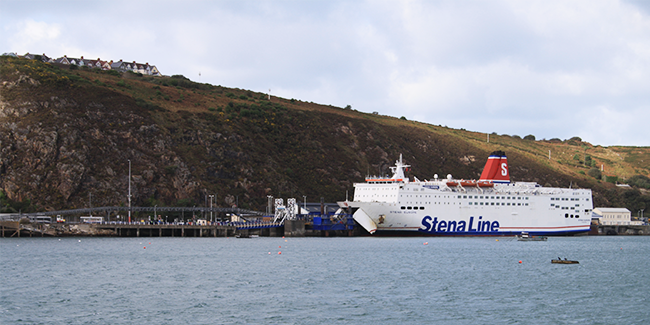A 'no deal' Brexit would pose a serious threat to the ports sector in Wales, the National Assembly's External Affairs Committee has said.

As part of its inquiry into how Welsh ports are preparing for Brexit, the Committee heard repeated concerns about the vulnerabilities of Wales' major "Roll-on Roll-off" ports to any new delays for goods and vehicles after Brexit.
The Committee's Chair, David Rees AM, said:
"With less than five months to go until the UK leaves the European Union we undertook this work as we wanted to have confidence that the ports sector was prepared for any form of Brexit. What we found is that there needs to be a step-change in Welsh Government activity to support the sector prepare for a no deal Brexit.
"If our worst fears of new delays and checks at Welsh ports like Holyhead and Fishguard are realised, Wales will need detailed plans to manage the fallout. That is why we were calling on the Welsh Government to publish details of any traffic management contingency plans it has including outlining what new infrastructure spending may be required."
In 2016, just over 650,000 passenger vehicles and 524,000 lorries and unaccompanied trailers passed through Welsh ports.
Giving evidence the Road Haulage Association said that "current preparations are insufficient to avoid catastrophic disruption to supply chains. It warned:
"There is not, and will not, be sufficient trained and competent customs clearance agents or sufficient resources within UK and EU border agencies. It will not be possible to put systems in place, and to train sufficient people to deal with border processes in the UK or the EU by 30 March 2019".
The Committee was warned about potential disruption to the operation of freight and the risk of limited allocation of permits for travel between countries in Europe in a 'no deal' scenario.
David Rees AM said:
"In terms of the implications of Brexit for freight we heard that in the event of no deal being reached between the EU and the UK, freight operators and hauliers in Wales would have to rely on a very limited number of permits to continue operating. This was a matter of great concern to us and we call on the Welsh Government to work with key stakeholders to ensure they have what they need to apply for those permits."
Richard Ballantyne from the Welsh Ports group emphasised the sector needs an implementation period. He told us:
"We don't have the facilities. This is intra-EU movement, so it's been outside customs controls and port health controls for 25 years at least, which means we don't have the facilities and processes at the border already. So, anything that introduces those new checks is going to be quite a dramatic change and it's going to take time for both the port operators to build in new systems and the Government to build in their new arrangements."
Other sectors that indirectly rely on ports, such as aviation and tourism, also gave evidence to the Committee. David Rees said:
"Sectors such as Wales' tourism industry are also likely to be affected by the Brexit process. We've called on the Welsh Government to urgently look at improving its communication efforts with all sectors dependent on ports in Wales. "
The Committee makes seven recommendations in its report for consideration by the Welsh Government including;
that the Welsh Government publishes details of its contingency plan for managing traffic and congestion that may affect Welsh "Ro-Ro" ports in the event of any new checks and delays becoming necessary after the 29 March 2019 and details of any assessment that has been made in terms of the funding arrangements for any infrastructure that may be necessary.
that the Welsh Government explores with Welsh companies involved in international trade what assistance they may require in transitioning to a future customs arrangement.
that the Welsh Government outlines its views on the proposals for the Northern Ireland backstop and how they will affect operations at Welsh ports.
that the Welsh Government improves its overall communication with ports, and stakeholders connected with ports, such as freight and haulage organisations, travel operators, and the tourism sector to provide them with greater assurance around the preparations and planning for 29 March 2019.
that the Welsh Government provides updates on discussions with counterparts in the UK Government on new IT systems in relation to future customs arrangements.
that the Welsh Government works with its key economic stakeholders to ensure that they have the necessary capacity and resources to take part in the UK Government's permit application scheme
that the Welsh Government outlines in its response whether it intends to bring forward new environmental regulations after Brexit and how these may interact with the UK Government proposals for a "common rulebook" after Brexit.
Read the full report:
Preparing for Brexit: Follow-up report on the preparedness of Welsh ports (PDF, 319 KB)

